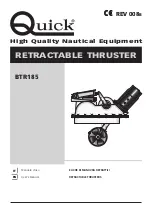
Chapter 4: AMI BIOS
4-27
sSATA Port 0~ Port 3
Select Enabled to enable an sSATA port specified by the user. The options are
Disabled and
Enabled
.
Spin Up Device
On an edge detect from 0 to 1, set this item to allow the PCH to start a COMRE-
SET initialization to the device. The options are Enabled and
Disabled
.
Device Type
Use this item to specify if the sSATA port specified by the user should be con
-
nected to a Solid State drive or a Hard Disk Drive. The options are
Hard Disk
Drive
and Solid State Drive.
*If the item above "Configure sSATA as" is set to IDE, the following items will
display:
sSATA Port 0~ Port 3
This item indicates that an sSATA port specified by the user is installed (present)
or not.
sSATA Device Type (Available when a sSATA port is detected)
Use this item to specify if the sSATA port specified by the user should be con
-
nected to a Solid State drive or a Hard Disk Drive. The options are
Hard Disk
Drive
and Solid State Drive.
*If the item above "Configure sSATA as" is set to RAID, the following items will
display:
Support Aggressive Link Power Management
When this item is set to Enabled, the SATA AHCI controller manages the power
usage of the sSATA link. The controller will put the link to a low power state when
the I/O is inactive for an extended period of time, and the power state will return
to normal when the I/O becomes active. The options are
Enabled
and Disabled.
sSATA RAID Option ROM/UEFI Driver
Select EFI to load the EFI driver for system boot. Select Legacy to load a legacy
OPROM for system boot. The options are Disabled, EFI, and
Legacy.
SATA/sSATA RAID Boot Select
Select SATA Controller to boot the system from a SATA RAID device. Select sSATA
Controller to boot the system from a sSATA RAID device. Select Both to boot the
system either from a SATA RAID device or from an sSATA RAID device. Please
note that the option-Both is not supported by the Windows Server 2012/R2 OS. The
options are None, Both, SATA Controller, and
sSATA Controller
.
















































